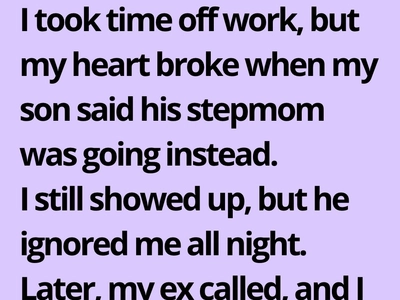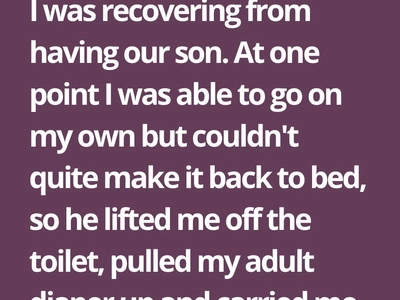The School Night Misunderstanding That Brought a Mother and Son Closer Than Ever
Some memories as a parent never fade — not because they’re perfect, but because they show how deeply our children can feel, how easily love can be misunderstood, and how powerful a single conversation can be.
I had been looking forward to the mother-son dinner at my twelve-year-old’s school for weeks. It wasn’t just another school event to me — it was a chance to sit beside my boy, laugh about silly things, and share a moment that was ours alone. I planned for it like it was a holiday. I adjusted my work schedule, made sure nothing would get in the way, and even picked out a dress that made me feel proud to be his mom.
All day, I thought about how his face would light up when he saw me there. I imagined us chatting about his friends, his favorite teacher, or whatever new thing he was obsessed with that week. Just a few hours of simple, uninterrupted time — that was all I wanted.
But life, as it often does, had other plans.
That evening, just as I was finishing up some last-minute work before heading out, my phone rang. It was my ex. His voice was calm, but there was something in the background that made my heart stop. I could hear our son crying.
The sound went straight through me. There’s nothing like hearing your child cry when you can’t reach out and hold them. I froze for a second, my chest tightening, the air around me suddenly heavy. Then came the truth — a simple misunderstanding that carried far more weight than it should have.
He hadn’t replaced me or chosen someone else over me. He had simply thought I was too busy.
Apparently, his stepmom had tried to help. She told him she could go in my place if I couldn’t make it. She meant well — there was no harm in her words — but something in the way she said it must have made him believe that I didn’t want to be there. So he told her she could go. And that tiny decision, born out of love and confusion, ended with me sitting in my car, holding back tears.
When I finally got him on the phone, his voice trembled. He kept saying he was sorry, that he didn’t know I wanted to come. I could barely speak. All the excitement I’d felt about that evening turned into this deep ache that I couldn’t shake.
He thought he was doing the right thing — sparing me from one more thing to handle. And in trying to protect me, he broke both our hearts just a little.
That night, I didn’t go to the dinner. I couldn’t. Not because I didn’t want to, but because I didn’t want to make it harder for him. I stayed home, replaying our conversation over and over again. I imagined him sitting there, surrounded by families, trying to smile even though he wished I was beside him.
When I finally went to bed, I felt a mix of sadness and something else — a realization, maybe — that children often carry more emotional weight than we think. They notice everything. They feel deeply. And sometimes, they act out of love in ways that end up hurting them more than they know.
The next morning, I made pancakes — his favorite. The smell filled the kitchen as I waited for him to wake up. When he came downstairs, his hair messy and his eyes still a little tired, he looked at me like he wasn’t sure what to say. So I smiled first.
We sat across from each other at the table. The silence between us wasn’t awkward — just heavy, like both of us were afraid to say the wrong thing. I finally took a breath and said softly, “Hey, I’ll always be there for you. Not just for school dinners or big events. For everything — even the small, ordinary days.”
He didn’t answer right away. He picked at his pancakes, then leaned toward me and said in this quiet, almost guilty voice, “I missed you last night. I just didn’t know how to tell you.”
That was it. That one sentence melted every bit of guilt I’d been holding on to. I reached across the table, brushed his hair from his forehead, and told him how much I loved him.
It was one of those raw, honest moments that you never plan but always remember. Because in that moment, I realized that love between a parent and child isn’t about always getting it right. It’s about being there after things go wrong. It’s about choosing connection, even after misunderstanding.
We spent the rest of the day together. No big plans — just time. We played board games, watched a movie, laughed about silly things, and even made plans for another “just us” outing. It didn’t matter where we went or what we did. What mattered was that he knew I was his, always.
By the afternoon, the heaviness from the night before had lifted. He was back to his cheerful self, teasing me for losing at the game we played, asking me to make more pancakes even though we’d already had plenty. It was as if the simple act of spending the day together had stitched up a small tear between us.
Later, when I watched him reading on the couch, I found myself thinking about how easily these moments slip by when life gets busy. We’re always rushing — to work, to errands, to responsibilities — and we assume our kids know how much we care. But sometimes they don’t. Sometimes they need to hear it, see it, feel it.
That night, after he went to bed, I walked into his room and looked at him sleeping. His face was calm again, his breathing soft and steady. I thought about how fragile this time is — these years when they still want us close, still look for our approval, still think we can fix everything. One day, that changes. They grow older, more private, harder to read. And that makes moments like this even more precious.
I realized then that love, especially between a parent and child, doesn’t need grand gestures. It doesn’t need perfect timing or flawless communication. It just needs presence — the kind that says, “Even when you misunderstand me, even when we mess up, I’m still here.”
In the end, the missed dinner didn’t matter. What mattered was what came after — the talk, the closeness, the renewed understanding. Sometimes love hides behind the smallest misunderstandings, waiting for us to slow down and notice. And when we do, it’s like finding something we didn’t know we’d lost.
Weeks later, his school sent out photos from the dinner. I scrolled through them online — smiling faces, bright lights, parents chatting at tables. Then I saw him. He wasn’t smiling as wide as usual, but there was this quiet strength in his expression, like a boy who was learning that love doesn’t disappear just because things don’t go as planned.
I saved that picture. Not because it was perfect, but because it reminded me of something real — that even when parenting feels like a series of missed chances and small heartbreaks, it’s also full of grace. Every misunderstanding can become a bridge if we let it. Every moment of hurt can turn into connection if we listen closely enough.
A few days after that, he asked if we could have another “mother-son” night — just the two of us, at our favorite diner. He wanted to wear a nice shirt and even held the car door open for me, like a little gentleman. We ordered burgers and fries, laughed about the time he spilled soda on his homework, and talked about his dreams — the big, wild ones that only twelve-year-olds have.
At one point, he looked at me and said, “I’m glad you came this time.” It was such a simple sentence, but it carried so much. I smiled and told him I’d never miss another one if I could help it.
Driving home, he fell asleep in the back seat, and I glanced at him in the mirror — this boy who was growing up so fast, yet still needed me in ways only a mother could understand. I thought about how easily love can get lost in translation, how often we assume our children know what’s in our hearts, when sometimes they just need to be reminded.
That night, as I tucked him into bed, he said, “Mom, I know you’re busy, but I like when you’re here.” And I realized that was all he ever wanted — my time, my attention, my presence.
Sometimes parenting isn’t about being perfect. It’s about showing up, again and again, even when you stumble. It’s about the quiet mornings and the gentle talks after the tears. It’s about turning a missed dinner into a memory that holds more meaning than the event ever could.
And as I turned off the light and closed his door, I knew this would be one of those moments that would never fade — not because it was picture-perfect, but because it reminded me just how deeply our children feel, and how every small misunderstanding can become another way to say, “I love you.”






